One look at the action on Valeant’s stock on Tuesday, and now investors understand why Jim Cramer preaches that when the words “accounting irregularity” are associated with a company, that always means sell.
Investors repeatedly assured Cramer that Valeant’s cash flow was so strong he didn’t have to pay attention to the decline in the stock because it was all emotional. After all, they said, prior to Tuesday it had already fallen so much and it was way overdone.
“I heard this ‘way overdone’ argument from pretty much everyone I talked to,” the “Mad Money” host said.
But Cramer still refused to buy Valeant.
“That should have been the clarion call to get out no matter what. When you see accounting irregularities you sell first and ask questions later.”
Some even tried to convince Cramer that Walgreen’s gave its seal of approval with its deal on cheaper drugs with Valeant so there was nothing to worry about.
Cramer did not believe it, and added that Walgreen’s also gave its good housekeeping seal of approval to Theranos and subsequently backed away after the FDA raised questions about the blood testing firm’s methodology.
Read more from Mad Money with Jim Cramer
Cramer Remix: Biggest break-up since Ben & Jen
Cramer: 6 groups in fabulous bull market mode
Cramer on tobacco: Stinking up your portfolio?
“Even back when Valeant was a beloved stock, I had always been uncomfortable with their business model of rolling up drug company after drug company, slashing research and development and then raising prices,” Cramer said.
It wasn’t until The New York Times and short-selling research firm Citron openly questioned Valeant’s accounting that Cramer finally had a bearish story to back up his opinion. Citron compared the company’s accounting to Enron’s and said to sell the stock, admitting that it had shorted it and used a price target of $50.
Comparing any company to Enron is a stretch for Cramer, but nearly 50 points from Citron’s call, Valeant revealed it may have overstated its earnings the last time it reported.
“That should have been the clarion call to get out no matter what. When you see accounting irregularities you sell first and ask questions later,” Cramer said.
Cramer and his colleague from RealMoney.com, Carleton English, checked in with Citron’s Andrew Left on Tuesday to gain insight now that Valeant has hit its original downside target.
While Left admitted to Cramer that he was no longer short the stock, he did express concern that Valeant had overpaid on everything it acquired, and now it is in the predicament of slower sales and cannot raise prices.
With more than $15 billion in debt on its balance sheet, Cramer thought this was a valid question.
Thus Cramer stood by his tried and true rule that any time the question of accounting irregularities arises, investors should sell. It could come at the cost of missing out on benefits at times, but it could also avoid big disasters like Valeant.
“Believe me, you’ll always remember my admonition and smile that you avoided a stock that destroyed so many allegedly smart people who should have known better,” Cramer said.
[“source-gsmarena”]

